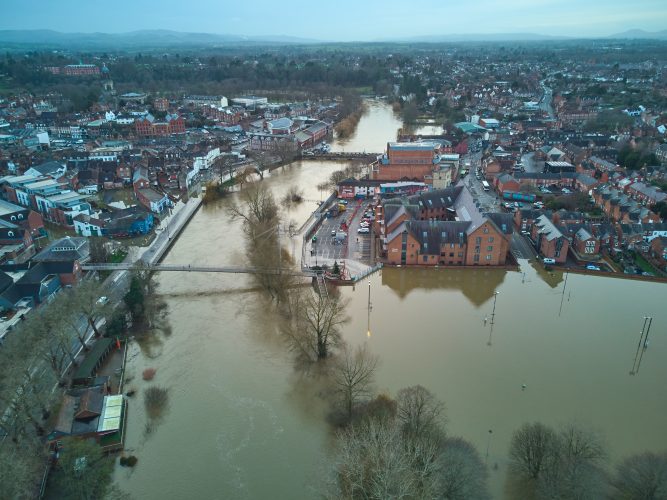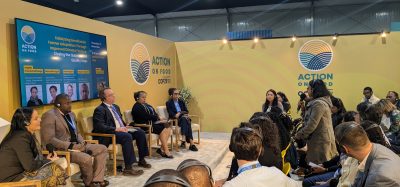NFU Conference: Moral bankruptcy, food security, and President Eisenhower
- Like
- Digg
- Del
- Tumblr
- VKontakte
- Buffer
- Love This
- Odnoklassniki
- Meneame
- Blogger
- Amazon
- Yahoo Mail
- Gmail
- AOL
- Newsvine
- HackerNews
- Evernote
- MySpace
- Mail.ru
- Viadeo
- Line
- Comments
- Yummly
- SMS
- Viber
- Telegram
- Subscribe
- Skype
- Facebook Messenger
- Kakao
- LiveJournal
- Yammer
- Edgar
- Fintel
- Mix
- Instapaper
- Copy Link
Posted: 21 February 2024 | Joshua Minchin (New Food) | No comments yet
New Food Editor Joshua Minchin dissects two important speeches made at the NFU Conference this week, and asks whether we can garner anything meaningful from them.


The week once again saw the hosting of the 2024 National Farming Union (NFU) Conference – one of the most important farming events in the calendar. The final day of the conference was dominated by two speeches from two leaders: one from Minnette Batters, NFU President, and one from Rishi Sunak, UK Prime Minister. Did we learn anything new? Could anything meaningful be gleaned from these two heavyweight addresses? The often-frustrating answer is yes, and no.
A welcome spotlight on food security
We’ve probably had more discussion about food security in traditionally developed countries in the past few months than we have in the past few years. None more so than the UK, which has seen searing price increases in food for some time now.
In her final address to an NFU Conference, Batters chose to highlight the vulnerability of the UK’s food security, and stressed that she’d like “all parties committed to treating food security as the same strategic priority as energy security.”
Shortly after, Sunak said that “food security is a vital part of our national security. “And recent years have brought home the truth of that.
“Putin set off not just an energy price bomb…but a food price bomb, too.”
Attention is welcome, but action is needed. Batters suggested that, amid serious flooding across England in particular, farmers should be paid for holding floodwater on their land.
“Some winter crops didn’t get planted and some of those that did have been washed away. In places, sugar beet and potatoes remain rotting in the ground and many of our food producing floodplains have been used to store water to protect houses and businesses,” she said.
“We must pay farmers for storing flood water on their land. We must speed up planning for on farm reservoirs to store water for crop irrigation. Water security must underpin national food security. In a world that is becoming more water insecure, the wasting of diffuse water into the sea has to end.”


Flooding in some parts of England, like Shrewsbury, has been severe in 2024
Sunak acknowledged the challenges farmers have faced in terms of flooding in his speech. Perhaps more interestingly though, he revealed a new measure to monitor UK food security.
“I can announce we’ll step up our monitoring with a new annual Food Security Index, which we expect to be UK-wide,” he told the conference.
He also revealed that the UK Government will launch “the biggest ever package of grants this year to boost productivity and resilience, which will total £220 million.”
Moral bankruptcy? Trade deals proving tricky
Batters took the opportunity to reflect on four years as NFU President by recalling the plethora of Prime Ministers, Secretaries of State and crises she has dealt with in a relatively short space of time. She also, however, took aim at previous administrations and praised more recent ones when it comes to negotiating post-Brexit trade deals.
“In 2014, when I was elected Deputy President, the UK was a full member of the European Union. I became President in 2018 and we immediately went to the cliff edge, not once but three times, with a catastrophic ‘no deal Brexit’.
“My second term started in 2020. Within a month Covid-19 had struck, we were in lockdown and leading the NFU from our farms. Our staff were all working from home and a combination of Prime Minster Boris Johnson and President Trump were committed to concluding a US/UK free trade agreement by August.
“Let’s not forget, the Johnson government was legislating on raising standards of animal welfare and environmental protection here at home, but that same government was only too happy to import food that would be illegal to produce here.
“It was a morally bankrupt position.”
She went on to praise the impact of the NFU and its members in campaigning to stop “hormone-treated beef and chlorine-washed chicken” being imported into the UK, calling it “a line in the sand” that was drawn. There was also praise for Sunak’s administration, which she said “had the courage to walk away from the enhanced trading relationship with Canada, who have always been determined to get their hormone treated beef onto our market.”
Sunak acknowledged this in his following speech: “You asked for fair treatment in our trade deal, so we’re standing up for our farmers in those negotiations – whether it’s with Canada or anybody else.”
It’s some rare respite for a UK Government that has come under significant fire from the food and beverage sector since Sunak took to Number 10 in the Autumn of 2022.
Perhaps tellingly though, Batters stressed that “in the run up to a general election, the ability to work well with all parties is critical.” She is of course correct; all outcomes are possible in an election that will surely come in 2024 (there is a slim chance of a 2025 election).
https://www.newfoodmagazine.com/article/219788/dont-sleepwalk-into-food-insecurity/
But that fragility perhaps suggests why Sunak spoke at the conference in the first place. One assessment is that as Prime Minister, he is deeply interested in an industry which occupies 71 percent of UK land. Another, more cynical one, is that the farming vote is by no means insignificant. Figures from Deltapoll revealed at the NFU Conference itself suggested that vote in “farming heartlands” might plummet to 32 percent from 58 percent for the Conservatives in 2019.
Confidence in farmers, in and out of Westminster
One thing we did learn from the NFU Conference is that the British public backs farmers. Delivering a keynote speech, Co-founder of Deltapoll Joe Twyman announced that its data revealed 94 percent of the public “said that support for farmers was ‘very’ or ‘fairly’ important”.
“Getting 94 percent of the British public to agree on anything is very difficult and unusual,” he said. “Only 90 percent of British public believe men and women should be paid equally”.
“The evidence is clear – the British public is behind us every step of the way,” Batters told the NFU.
Trust was a theme throughout Sunak’s speech. This is perhaps not surprising in this context, but what might be surprising is the use of a quote from the 34th President of the United States Dwight D Eisenhower in reinforcing the importance of trust.
“We’ve got to build a culture that’s based on trust. As President Eisenhower said: ‘You know, farming looks mighty easy when your plow is a pencil, and you’re a thousand miles from a corn field.’
“So we’re changing the culture.That means trust, support, co-operation.
“You can trust us because I know how important my neighbours, our farmers, all of you, truly are.
You help support millions of jobs, add billions to our economy, shape the landscape, but most of all, you produce the food we need – food that is some of the best and highest quality anywhere in the world.
“And that’s why I say to all of you and to Britain’s farmers, just as I did in my first days in Parliament: I’ve got your back.”
It is extremely unlikely that an acting world leader would ever come out and express a lack of support for their farmers (polls would not be necessary to measure the impact of such a statement). But an overt show of support on a national stage is telling. Whether that support and those promises translates into impact for farmers in an election year remains to be seen.
Recognition of the importance and crucial nature of farmers in our fragile food system is, however, welcome.
Related topics
Environment, Food Security, Regulation & Legislation, Sustainability









